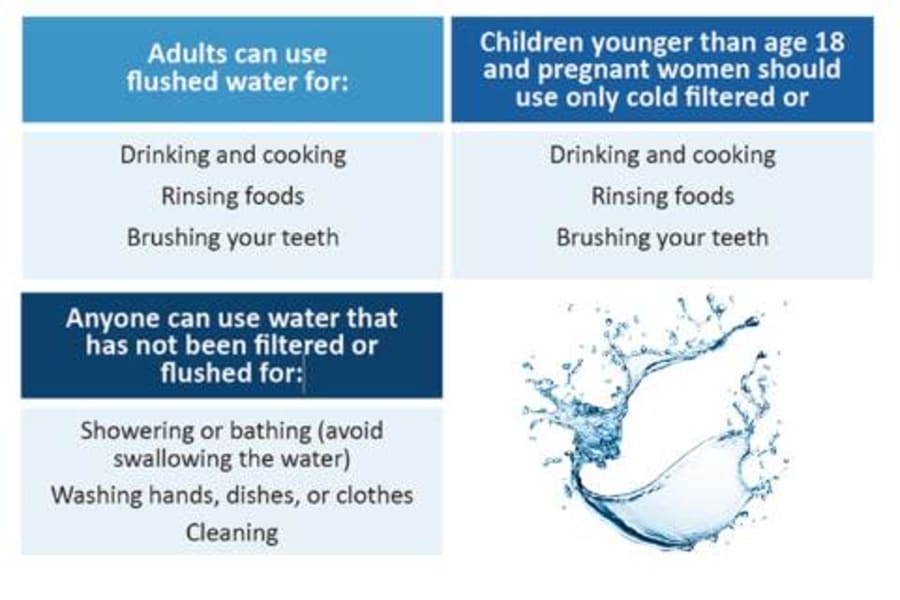WAYNE, Mich. – Wayne County issued a public advisory for the City of Wayne after lead was found to be above the Action Level in the public water supply. Here’s what residents need to know.
Wayne County issued the advisory on July 21 after testing revealed lead levels in the City of Wayne were above the state’s Action Level Exceedance for lead in water. What’s that mean?
Recommended Videos
If your water has an Action Level Exceedance (ALE) that means during recent testing, drinking water taken from more than 10 percent of the homes that were tested in your community exceeded the action level for lead (15 parts per billion). In response, the public water authority must take action to reduce the amount of lead in the water. Not all homes in the community are tested.
When a community has an ALE, the Michigan Department of Health and Human Services (MDHHS) recommends that children under age 18 and pregnant persons should consume only water that is run through a lead-reducing water filter. This recommendation is made because children and fetuses are most at risk of harm to their health from lead.

How does lead get into drinking water?
Lead can enter drinking water when it comes in contact with lead service lines (the pipes that bring water from the water main into your home) or with lead plumbing inside your home. When pipes or faucets containing lead begin to break down, the lead can get into your drinking water. The lead can be dissolved or in small pieces in the water.
How do I test my water for lead?
Testing your water with a certified lab is the only way to find out how much lead is in your drinking water. Your public water supply may offer to test your water for free. If not, you can test it yourself. Visit Michigan.gov/EGLElab and choose “Drinking Water Laboratory” to learn how to order a test kit. The cost is typically $30. If you have questions about testing your water, you can contact MDHHS at 844-934-1315.
Free lead filters available for City of Wayne Residents who meet eligibility criteria
*Households with, or frequently visited by, children under 18 or pregnant persons AND a member is enrolled in Medicaid or WIC OR unable to afford a filter
- City of Wayne Department of Public Works35200 Forest Ave. Wayne, MI 48184
- 7:00AM-3:00PM, Monday-Friday (734) 721-8600
What steps can I take to reduce lead in my drinking water?
Use a point-of-use (POU) water filter. A certified lead-reducing filter can reduce lead in drinking water. Filters are made to reduce lead, but do not guarantee that all lead will be removed from drinking water. A POU water filter reduces contaminants at the point water is being used, such as a faucet. Look for these certifications on the filter package: NSF/ANSI Standard 53 for lead reduction and NSF/ANSI Standard 42 for particulate reduction (Class I).
MDHHS recommends that households with, or frequently visited by, children younger than age 18 or pregnant persons use cold filtered water for drinking, preparing food, and cooking. MDHHS recommends using cold filtered or bottled water for mixing powdered infant formula.
A water filter system costs about $30. Replacement cartridges cost about $5-$10 each and should be changed as directed by the manufacturer.
If your household includes or is frequently visited by children younger than age 18 or pregnant persons and unable to afford a water filter system or replacement cartridges, you may be able to get them for free. To find out if you qualify, call your public water supply or Wayne County Public Health Division at 1-866-610-3885.
Get your water moving. Flushing water pipes can reduce the amount of lead in your water. If you have not used your water for several hours, flush your pipes following your public water supply’s recommended amount of time.
Do not use hot water for drinking or cooking. Lead dissolves more easily in hot water. Note: Lead is not removed by boiling water. Do not boil water to reduce lead. Clean your faucet aerators. Clean the mesh screen, or aerator, on the end of your faucet at least every six months. If construction is being done to the water system or pipes near your home-including water meter replacement in your home-check and clean your drinking water faucet aerator every month until the work is done.
Consider replacing older plumbing, pipes, and faucets that may add lead to water. Older faucets, fittings, and valves sold before 2014 may contain up to 8 percent lead, even if marked “lead-free.” Look for replacement faucets made in 2014 or later and make sure they are NSF 61 certified or marked to contain 0.25 percent lead or less. Check your plumbing or hire a plumber to know what parts should be replaced to reduce lead in your drinking water.




